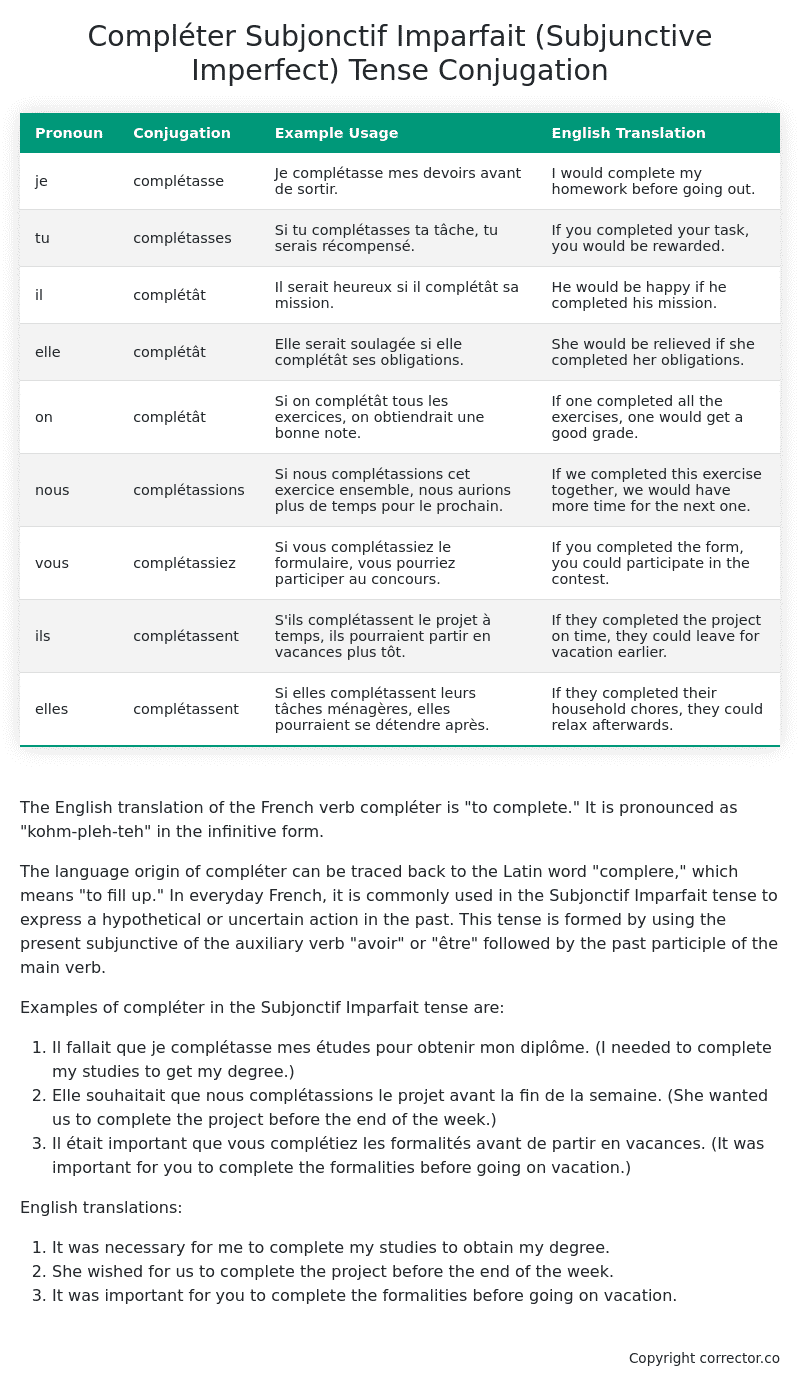Subjonctif Imparfait (Subjunctive Imperfect) Tense Conjugation of the French Verb compléter
Introduction to the verb compléter
The English translation of the French verb compléter is “to complete.” It is pronounced as “kohm-pleh-teh” in the infinitive form.
The language origin of compléter can be traced back to the Latin word “complere,” which means “to fill up.” In everyday French, it is commonly used in the Subjonctif Imparfait tense to express a hypothetical or uncertain action in the past. This tense is formed by using the present subjunctive of the auxiliary verb “avoir” or “être” followed by the past participle of the main verb.
Examples of compléter in the Subjonctif Imparfait tense are:
- Il fallait que je complétasse mes études pour obtenir mon diplôme. (I needed to complete my studies to get my degree.)
- Elle souhaitait que nous complétassions le projet avant la fin de la semaine. (She wanted us to complete the project before the end of the week.)
- Il était important que vous complétiez les formalités avant de partir en vacances. (It was important for you to complete the formalities before going on vacation.)
English translations:
- It was necessary for me to complete my studies to obtain my degree.
- She wished for us to complete the project before the end of the week.
- It was important for you to complete the formalities before going on vacation.
Table of the Subjonctif Imparfait (Subjunctive Imperfect) Tense Conjugation of compléter
| Pronoun | Conjugation | Example Usage | English Translation |
|---|---|---|---|
| je | complétasse | Je complétasse mes devoirs avant de sortir. | I would complete my homework before going out. |
| tu | complétasses | Si tu complétasses ta tâche, tu serais récompensé. | If you completed your task, you would be rewarded. |
| il | complétât | Il serait heureux si il complétât sa mission. | He would be happy if he completed his mission. |
| elle | complétât | Elle serait soulagée si elle complétât ses obligations. | She would be relieved if she completed her obligations. |
| on | complétât | Si on complétât tous les exercices, on obtiendrait une bonne note. | If one completed all the exercises, one would get a good grade. |
| nous | complétassions | Si nous complétassions cet exercice ensemble, nous aurions plus de temps pour le prochain. | If we completed this exercise together, we would have more time for the next one. |
| vous | complétassiez | Si vous complétassiez le formulaire, vous pourriez participer au concours. | If you completed the form, you could participate in the contest. |
| ils | complétassent | S’ils complétassent le projet à temps, ils pourraient partir en vacances plus tôt. | If they completed the project on time, they could leave for vacation earlier. |
| elles | complétassent | Si elles complétassent leurs tâches ménagères, elles pourraient se détendre après. | If they completed their household chores, they could relax afterwards. |
Other Conjugations for Compléter.
Le Present (Present Tense) Conjugation of the French Verb compléter
Imparfait (Imperfect) Tense Conjugation of the French Verb compléter
Passé Simple (Simple Past) Tense Conjugation of the French Verb compléter
Passé Composé (Present Perfect) Tense Conjugation of the French Verb compléter
Futur Simple (Simple Future) Tense Conjugation of the French Verb compléter
Futur Proche (Near Future) Tense Conjugation of the French Verb compléter
Plus-que-parfait (Pluperfect) Tense Conjugation of the French Verb compléter
Passé Antérieur (Past Anterior) Tense Conjugation of the French Verb compléter
Futur Antérieur (Future Anterior) Tense Conjugation of the French Verb compléter
Subjonctif Présent (Subjunctive Present) Tense Conjugation of the French Verb compléter
Subjonctif Passé (Subjunctive Past) Tense Conjugation of the French Verb compléter
Subjonctif Imparfait (Subjunctive Imperfect) Tense Conjugation of the French Verb compléter (this article)
Subjonctif Plus-que-parfait (Subjunctive Pluperfect) Tense Conjugation of the French Verb compléter
Conditionnel Présent (Conditional Present) Tense Conjugation of the French Verb compléter
Conditionnel Passé (Conditional Past) Tense Conjugation of the French Verb compléter
L’impératif Présent (Imperative Present) Tense Conjugation of the French Verb compléter
L’infinitif Présent (Infinitive Present) Tense Conjugation of the French Verb compléter
Struggling with French verbs or the language in general? Why not use our free French Grammar Checker – no registration required!
Get a FREE Download Study Sheet of this Conjugation 🔥
Simply right click the image below, click “save image” and get your free reference for the compléter Subjonctif Imparfait tense conjugation!

Compléter – About the French Subjonctif Imparfait (Subjunctive Imperfect) Tense
Formation
Common Everyday Usage Patterns
Interactions with Other Tenses
Subjonctif Présent
Indicatif Passé Composé
Conditional
Conditional Perfect
Summary
I hope you enjoyed this article on the verb compléter. Still in a learning mood? Check out another TOTALLY random French verb conjugation!


